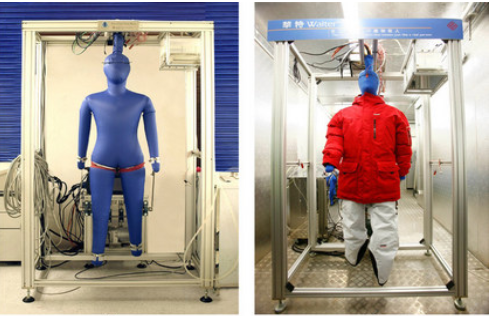Top 10 Comfort Testing Instruments
Comfort testing instruments are essential in evaluating how textiles, garments, footwear, and protective equipment perform in real-world conditions. They help manufacturers and laboratories measure thermal comfort, breathability, moisture management, softness, skin friction, elasticity, and ergonomic performance. These instruments ensure products meet both consumer expectations and international quality standards.

From sportswear and outdoor gear to medical PPE and bedding, comfort testing plays a vital role in product development and quality control. Below is a comprehensive list of the Top 10 Comfort Testing Instruments, their applications, key testing items, advantages, disadvantages, and standards compliance.
1. Thermal Manikin (Sweating or Non-Sweating)
Applications: Protective clothing, outdoor garments, uniforms, PPE, multilayer clothing
Functions: Simulates human heat and moisture transfer to evaluate thermal comfort
Test Items: Thermal insulation, evaporative resistance, heat loss, clo value
Standards: ISO 15831, ASTM F1291, ISO 7933
Pros:
Provides realistic simulation of human thermal behavior
Suitable for full-body and multi-layer garment evaluation
Generates comprehensive thermal comfort maps
Cons:
High cost and complex maintenance
Requires dedicated lab space and trained personnel
2. Moisture Management Tester (MMT)
Applications: Sportswear, underwear, quick-dry fabrics, knitted textiles
Functions: Measures liquid moisture transport, absorption, and drying
Test Items: Wetting time, absorption rate, spreading speed, overall moisture management capacity (OMMC)
Standards: AATCC 195
Pros:
Multi-dimensional moisture performance evaluation
Helps develop high-performance textiles
Cons:
Limited to fabric samples, not full garments
Requires precise sample preparation for accurate results
3. Air Permeability Tester
Applications: Woven fabrics, nonwovens, foams, filters
Functions: Measures breathability and airflow resistance
Test Items: Air permeability, pressure drop
Standards: ISO 9237, ASTM D737
Pros:
Quick, repeatable, and reliable
Suitable for a wide range of fabric types
Cons:
Does not provide overall comfort evaluation
Sensitive to environmental conditions
4. Water Vapor Permeability Tester
Applications: Waterproof breathable fabrics, outdoor gear, medical textiles
Functions: Evaluates moisture vapor transmission and breathability
Test Items: MVTR (Moisture Vapor Transmission Rate), water vapor resistance
Standards: ASTM E96, ISO 15496
Pros:
Essential for high-performance outdoor and medical products
Accurate assessment of breathability
Cons:
Long test duration
Requires strict environmental control
5. Fabric Softness Tester
Applications: Towels, bedding, apparel, tissues
Functions: Measures tactile softness and fabric hand-feel
Test Items: Softness value, compression softness, bending rigidity
Standards: ASTM D6828, WSP 90.5
Pros:
Quantifies subjective hand-feel
Useful for quality control and material selection
Cons:
Results may still need subjective confirmation
Not suitable for rigid or structured fabrics
6. Thermal Resistance & Conductivity Tester (Guarded Hot Plate)
Applications: Insulation textiles, foams, quilts, multi-layer garments
Functions: Measures heat transfer properties
Test Items: Thermal conductivity, thermal resistance, clo value
Standards: ISO 11092, ASTM D1518
Pros:
Highly accurate and reproducible
Widely accepted for thermal evaluation
Cons:
Sensitive to sample flatness
Limited to flat material testing
7. Skin Friction Tester
Applications: Underwear, baby products, medical bandages, sensitive-skin textiles
Functions: Measures fabric-to-skin friction and tactile comfort
Test Items: Coefficient of friction, slip-stick behavior
Standards: ASTM D1894 (adapted)
Pros:
Direct evaluation of skin comfort
Helps reduce irritation and chafing
Cons:
Requires standard skin-like materials
Environmental factors can affect results
8. Breathability & Differential Pressure Tester
Applications: Masks, medical textiles, nonwovens
Functions: Measures ease of breathing through fabrics
Test Items: Differential pressure (ΔP), breathing resistance
Standards: EN 14683, ASTM F2100
Pros:
Quick and reliable for PPE evaluation
Directly evaluates breathing comfort
Cons:
Only measures airflow, not overall comfort
Sensitive to sample clamping and alignment
9. Qmax Surface Cool Feeling Tester
Applications: Summer clothing, cooling textiles, bedding
Functions: Measures instant cooling sensation on contact
Test Items: Qmax cooling value
Standards: GB/T 35263, KES-F7
Pros:
Ideal for evaluating “cool touch” textiles
Provides quantitative data for comfort marketing
Cons:
Only measures immediate sensation
Environmental control required for accuracy
10. Fabric Wicking Tester
Applications: Sportswear, socks, moisture-wicking fabrics
Functions: Evaluates capillary moisture transport
Test Items: Wicking height, wicking speed
Standards: AATCC 197, ISO 9073-6
Pros:
Simulates sweat absorption and transport
Critical for athletic performance fabrics
Cons:
Wicking results influenced by sample cutting and preparation
Does not measure horizontal moisture spreading
How to Choose the Right Comfort Testing Instrument
Define your testing purpose
Breathability & moisture management: Air permeability, water vapor permeability, MMT
Thermal comfort: Thermal resistance, thermal conductivity, thermal manikin
Hand-feel: Fabric softness tester
Cooling effect: Qmax tester
Stretch and fit: Stretch & recovery tester
Check for standards compliance
ISO, ASTM, AATCC, GB/T, EN—especially crucial for export products.
Maintenance and consumables
Moisture or vapor testers need consumables
Thermal manikins require annual calibration and maintenance
Environmental simulation
Consider temperature, humidity, sweating, or airflow simulation depending on test needs.
Why Choose QINSUN
QINSUN specializes in comfort testing instruments for textiles, garments, PPE, and technical materials. We provide complete lab solutions, customized configurations, global shipping, and long-term technical support to ensure accurate comfort evaluation. Whether for R&D, quality control, or product development, QINSUN offers reliable instruments and professional guidance to meet all comfort testing requirements.
2025-11-19 10:49
